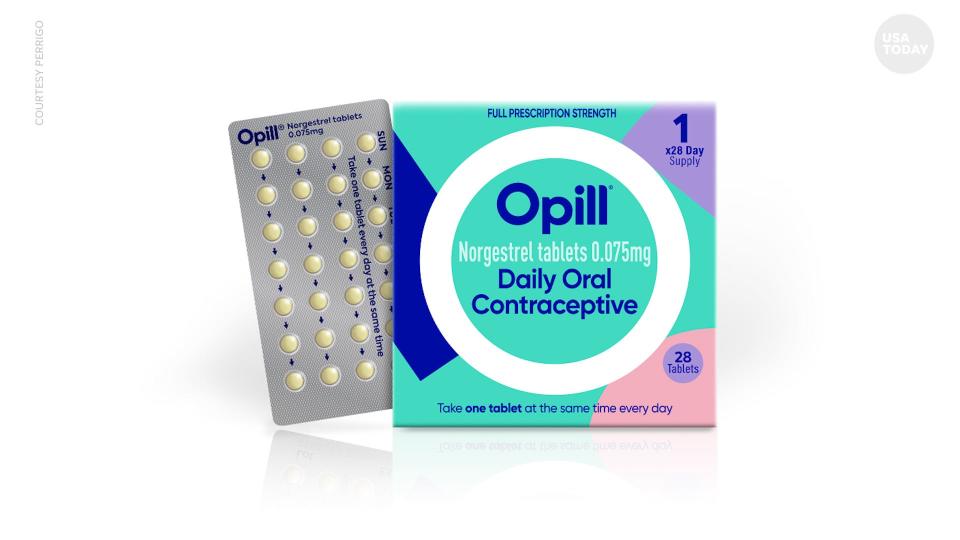America's first over-the-counter birth control pill will be available soon
More than 50 years after the oral contraceptive pill went on the market in the United States, the country's first over-the-counter birth control pill will be available in stores and online nationwide this month.
Known as Opill, the birth control pill will be available without prescription in major retailers and pharmacies in late March, the drug's maker, Perrigo, announced Monday.
"People have a new choice, a new option to access the oral contraceptive pill without a prescription," said Dana Singiser, co-founder of Contraceptive Access Initiative, an nonprofit advocacy group.
The medication will cost $19.99 for a one-month supply and $49.99 for a three-month supply in stores. Online customers can buy Opill at Opill.com for $49.99 for a three-month supply and $89.99 for a six-month supply. Patients may begin pre-ordering the drug from select stores as of this week.
"A lot of consumer research went into our setting the retail price," said Sara Young, chief commercial officer at Perrigo.
Opill, which is 98% effective at preventing pregnancy, was approved by the Food and Drug Administration in July 2023 and will be the first of its kind available to Americans over-the-counter.
"For the first time in history, there is no permission required to access to birth control pills," Young said. "It's truly a groundbreaking reproductive health product that will address key unmet need for contraceptive access."
Now that details about access of Opill have emerged, reproductive health advocates say stocking the pill on retailer shelves and online is a step in the right direction ? but more still needs to be done to ensure equitable access to quality reproductive health care nationwide.

What reproductive rights advocates have to say about Opill
Reproductive rights advocates described the arrival of Opill to American consumers as a major victory but underscored the obligation to address other barriers to access from cost to geographic availability.
A first priority should be improving over-the-counter availability for other forms of birth control pill. (Opill is progestin-only; other pills containing estrogen and progestin are still awaiting FDA approval.)
Perrigo confirmed that Opill can be paid or reimbursed through Flexible Spending or Health Savings Accounts (also known as FSAs/HSAs), although parameters of these specific savings plans typically depend on employers' unique coverage offerings.
The company confirmed a cost-assistance program will be announced in coming weeks to help qualified low-income, uninsured people get Opill. The company promised to let applicants know quickly if they qualify for the cost-assistance program.
Abortion pill's future: In first major abortion case since Roe's demise, Supreme Court to weigh in on mifepristone restrictions
Nearly $20 might be difficult for college students to pay monthly, said Dyvia Huitron, 20, a sophomore at the University of Alabama. She recently got on the pill and doesn't have insurance, but she pays about $18 for a three-month supply (nearly the cost of one Opill pack) using pharmacy coupons.
"I think it takes a certain kind of budgeting and decision-making process I don't believe students are thinking about," Huitron said. "You have to have that money readily available to make that purchase."
Singiser raised questions about how people will access Opill in areas where major retailers have few or no stores.
"Opill will use major pharmacy chains to distribute their product," she said. "I hope they look at other kinds of markets that are common throughout the country, particularly in rural areas."
Telemedicine could be an option
Once Opill's cost and availability is better understood, Nurx, a telemedicine health care provider, plans to stock the medication, according to Nurx Chief Business Officer Caroline Hofmann.
The online provider serves more than 500,000 women across the U.S., and more than 40% of those patients live in the South. Current birth control pill offerings can cost as little as $15 on Nurx, less than Opill's in-store or online price, and Nurx offers automatic refills.
As of now, a prescription is necessary to get birth control pills from Nurx. So the arrival of Opill to virtual retailers like this one would basically transform the process into a one-stop shop for people, Hofmann said.
"That is one more option in our arsenal we can equip women with," Hofmann said. "This would truly make it a one-touch type of experience."
Deciding whether it's right for you
Though Nurx has yet to launch Opill on its platform, Hofmann said a majority of women may still opt for an appointment with a medical provider for reasons of cost and trust.
"Our hypothesis is that for the vast amount of women, it will still be cheaper to access contraceptives using their insurance versus buying Opill over-the-counter," Hofmann said, adding that many insurers don't have co-pays for a visit or for generic birth control pills already. "It will still be from an affordability standpoint likely to be cheaper for a lot of patients to get a prescription."
Just because the pill is available without a prescription doesn't mean people will stop seeing their provider, said Dr. Raegan McDonald-Mosley, CEO of Power to Decide, CAI chief medical adviser and a practicing OB-GYN.
But making Opill available without a prescription "removes the barriers for people who know they want to use this method specifically," McDonald-Mosley said. "They don't have to jump through hoops to see a provider or take time off from work or navigate child care. But it doesn't preclude them from coming to see me or another provider if they have additional questions or want a different method."
She added it's important to contextualize the Opill with how people experience birth control over life, from when they get a period in adolescence to menopause later in life. Depending on their life stage, they may start with a pill early before moving to a more long-term solution like an implant in middle age, she said.
Opill.com offers educational materials about the drug's safety and health in English and Spanish, Young said.
Education is key for young people looking to use contraception for the first time, Huitron said, adding that for college students like her, leaving home can mean an immense burden to navigate health care decisions independently for the first time without familiar support systems. This makes young people especially vulnerable to misinformation about contraceptive decisions they may see on social media sites like TikTok, she said.
Misinformation "causes people in my age range who are very impressionable and who may not have strong awareness of their bodies to (avoid) birth control just because they hear people whispering in their ear," she said.
To decide whether Opill is the right choice, McDonald-Mosley said, it's best to consider the following:
Preexisting health conditions? If you're already pregnant, have breast cancer or have undiagnosed irregular bleeding, McDonald-Mosley suggests not taking the progestin-only pill and consulting your medical provider.
Do you prefer to have a regular period? Patients on progestin-only pills like Opill take a pill daily for four weeks in a row without the "skip" or "placebo" week people may be used to having with combined pills, she said. This means users might experience some random bleeding or spotting. If you prefer having regular cycles of bleeding, McDonald-Mosley said, the progestin-only pill might not be the preferred option.
Are you a consistent person? The progestin pill must be taken within a three-hour window daily, McDonald-Mosley said, or else it can be ineffective. If you're someone who can reliably take the pill at the same time every day, it's probably a good fit for you. If you can't fit that regimen, a combination pill might be the better option, she said.
The election in the backdrop
The availability of the drug comes as the Biden administration attempts to rally around reproductive rights in the 2024 campaign season, a move galvanized by the fall of Roe v. Wade, the Supreme Court decision that had established the right to an abortion. As 14 states have moved to outright ban abortion and other states weigh restrictions, birth control has become an urgent topic for many people looking to avoid unwanted pregnancy.
Hofmann said she has yet to see either side of the political debate attack "plain vanilla contraceptive care" to the extent other facets of reproductive rights, including abortion and emergency contraception, have been conservative targets. Though she celebrated the expansion of birth control access, she said, the battle for equal care is about the whole of its parts.
"Just over-the-counter birth control is not the only solution," she said. "I think we really need to take a step back and think about: How do you provide high quality care everywhere in the country. How do you make it affordable?
"This is a great step but it shouldn't be the only step."

How Opill works
Opill uses the synthetic hormone progestin to thicken cervical mucus, which blocks sperm from entering the uterus and prevents pregnancy.
Though most other birth control pills use progestin and estrogen, progestin-only pills like Opill are often recommended for people who can't take combination pills for health reasons.
Hormone-based pills, like Opill, have long been one of the most common forms of birth control nationwide and have been used by tens of millions of people since the 1960s.
Norgestrel was first approved in the U.S. in 1973 and marketed by Pfizer as the prescription product Ovrette until it was discontinued in 2005 as combination birth control pills with estrogen and progestin became more popular. In 2015, HRA Pharma acquired norgestrel and rebranded it as Opill with the sole purpose of getting government approval to sell the pill over the counter.
Contributing: Adrianna Rodriguez
This article originally appeared on USA TODAY: Americans can purchase birth control over-the-counter later this month
